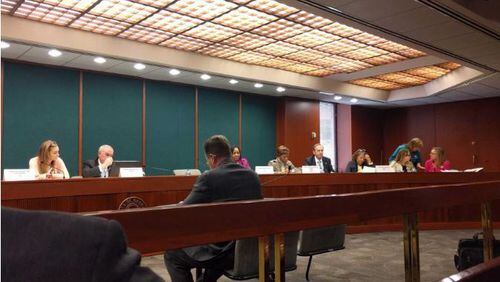The legislative proposal to improve Georgia’s lowest-performing schools exited a Senate committee Monday and could soon be on its way to the governor, assuming lawmakers agree to the recent changes.
Last year, voters rejected Gov. Nathan Deal’s referendum to give him authority to take control of “chronically failing” schools. Unlike that measure, the new proposal doesn’t need voters’ approval because it’s not a constitutional amendment. It relies on collaboration with local school districts to improve schools, though districts could suffer financial consequences plus intervention anyway if they refuse to let the state in voluntarily. It doesn’t need voters’ approval because it’s not a constitutional amendment.
House Bill 338 is now named the First Priority Act instead of "plan b," the informal moniker by which it has been known around the Capitol. It passed the House of Representatives with bipartisan support on March 1, and Rep. Kevin Tanner, R-Dawsonville, said he's hoping for the same outcome when his bill reaches the Senate floor. It cleared a major obstacle Monday when the Senate Education and Youth Committee passed it with amendments.
Among them was giving a targeted school more time to show improvement. Under the House version, the state could hand low performers to nonprofit managers or convert them to charter schools after two years, but the bill now says three. The legislation also offers further clarification that no for-profit companies will wind up controlling any schools that become subject to state intervention. The possibility of for-profit managers was among the major points of criticism by opponents of the Opportunity School District referendum, which voters defeated in November.
“I’m not sure that was going to be allowed anyway,” Tanner said after Monday’s hearing. “So I was fine with that.”
The legislation builds a new mechanism for state intervention in schools performing poorly on state measures. State law has long allowed the state to step in, but the Department of Education has not intervened to the full extent of the law. One reason Deal’s supporters gave for pushing last year’s proposed constitutional amendment was a need to clarify state authority to take control of schools.
This new legislation sidesteps that question by getting school districts to allow the state to come in. All but two of Georgia’s 180 school districts have signed “flexibility” contracts giving them waivers from state mandates for things like maximum class sizes or a minimum number of annual school days. Those waivers save money, and schools that refuse to cooperate with the mandates in HB 338 would lose them.
The legislation sets up a process for identifying the worst-performing schools and establishing "turnaround" plans. The schools would be identified by a "chief turnaround officer" reporting to the state board of education, which is appointed by the governor. Superintendent Richard Woods, Georgia's only elected statewide school official, wanted the officer reporting to him, but hasn't gotten that. Lawmakers did make one change that favors Woods and his Department of Education, though: in the version of the bill passed by the House, the Governor's Office of Student Achievement set the criteria for inclusion on a poorly-performing list; the Senate version uses DOE's method for identifying poor performers.
The Senate version also clarifies that school districts, after creating a "turnaround plan" with the chief turnaround officer, must pay for implementation, unless they can demonstrate financial need. The legislation is silent on where money would come from to help districts, but Tanner said Deal is committed to funding the measure. Also, a separate bill establishing a tax credit program for public school "innovation" grants, House Bill 237, passed out of the Senate Finance Committee Monday on a 7-6 vote. It was amended to an annual cap of $5 million, down from the $7 million in the original bill, and set to end after three years.
If the Senate approves the measures, they'll return to the House for a vote on the changes. Then, it would go to Deal, who publicly supported the version approved by the House.
Critics of the First Priority Act like that it focuses on student poverty as an obstacle to student achievement. One other bill that moved out of a key committee Monday also targets poverty.
Senate Bill 30 outlines a pilot program that would bring faith-based groups, businesses and philanthropies together to provide food, tutoring and medical services to improve the educational environments of struggling schools. Sen. Vincent Fort, D-Atlanta, minority whip and Atlanta mayoral candidate, presented his bill to the House Education Committee, telling them "wraparound services are critical." With the committee's approval, the bill heads to the full House.







